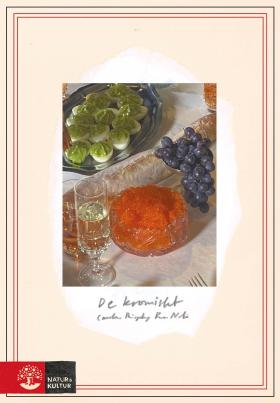
D e kroniskt
(It is chronic)
by Caroline Ringskog Ferrada-Noli
reviewed by Željka Černok
The opening sentence could easily go on a list of the best first sentences in literature: 'I have never before seen so many non-white people in the centre of Stockholm, indoors, sitting on chairs, as I did in the waiting room of the Sankt Göran pain clinic.' Caroline Ringskog Ferrada-Noli is not the kind of writer who beats about the bush; we get the framework, we get the style. In this, her third novel, main character Anne is suffering from chronic pain after childbirth and seeking relief. But is it psychosomatic, caused by all of the childhood trauma she has not dealt with? Or is it just the disappointing realisations that come with reaching middle age? Being a woman means ‘being an open fireplace in the life of other people, but the open fireplace does not serve itself. It serves others. I don't want it to be like that. But it is like that. This made me want to die. Since suicide is not accepted by society I have, instead, developed a chronic pain, cause unknown, as it says in my patient journal. How absolutely typical for girls.’
Written in fragmentary prose in 210 short chapters, this is a meandering, furious (and sometimes infuriating) monologue on the lives of women in the past and now, on parental roles, understanding your youth and ill-advised choices. The heartbreak after losing a sibling. Immigration and racism. At one point, when Anne talks about her Chilean father, I was left speechless. This is the way she describes her dad’s wish to integrate in Swedish society: ‘(…) He loved it all. He made stuffed cabbage rolls. He did sports. He believed in Sweden for thirty years. Lived in all the fucking suburbs. Knew Palme. But, somehow, nothing came out of it’ – just a few sentences, flung out so seemingly casually, and there it is – the gist of it all. The topic so many authors write whole books about, grappling with details, trying to come to some sort of deeper conclusion. Put like this, combined with dark humour, it is brutal. It makes me wonder: is the prose at its most efficient like this, when there are no big reveals, when it is written in this way, so by-the-way and matter-of-factly? Because what the author says is – we all know this, c’mon. And it is a bit of a smack in the face to realise – well, yes.
As the narrator, Anne can be self-centred, naïve, cowardly, pretentious, self-hating, even cruel and this alone makes me think that Ottessa Moshfegh fans would love this book. It is also layered and smart. Caroline Ringskog Ferrada-Noli probes deep, using language that is at the same time provocative and nonchalant as well as precise and direct. As a critic at Dagens Nyheter has put it: ‘[the novel] is often unbearably precise, sad, lofty, spiced up with subtle literary hints like skeptical smiles towards the long tradition of females writing about pain’.
I found myself nodding, laughing, crying, frowning, underlining. Caroline Ringskog Ferrada-Noli is an author who has a lot to say. This was a joy to read.

D e kroniskt
Natur & Kultur, 2020
426 pages
Foreign rights: Lagercrantz Agency
Caroline Ringskog Ferrada-Noli is an author, screen writer and television producer and director. Her novel debut Naturen (Nature) came out in 2009, her second novel Rich boy in 2019, both to critical acclaim. Her writing is often praised for its intelligence, humour and portrayal of women's fates. Ringskog Ferrada-Noli is also known for the culture podcast En varg söker sin podd, which she has been co-hosting with Liv Strömquist since 2013.
